Centering Healing and the Leadership of Incarcerated People in the Fight
By Ashley Chambers
In the past year, communities across the nation have banded together in the fight for racial justice and to defend Black and Brown lives like George Floyd, Ahmaud Arbery, Breonna Taylor, Sean Monterossa, Daunte Wright and countless others who have lost their lives to state violence. We know that the safety, healing, and growth that our communities need comes from us, not police, prisons, and systems built on white supremacy.
Over the past 25 years, the Ella Baker Center (EBC) has built power in Black and Brown communities, organized with young people and families to hold elected officials accountable, close five youth prisons across California, and disrupt business as usual.
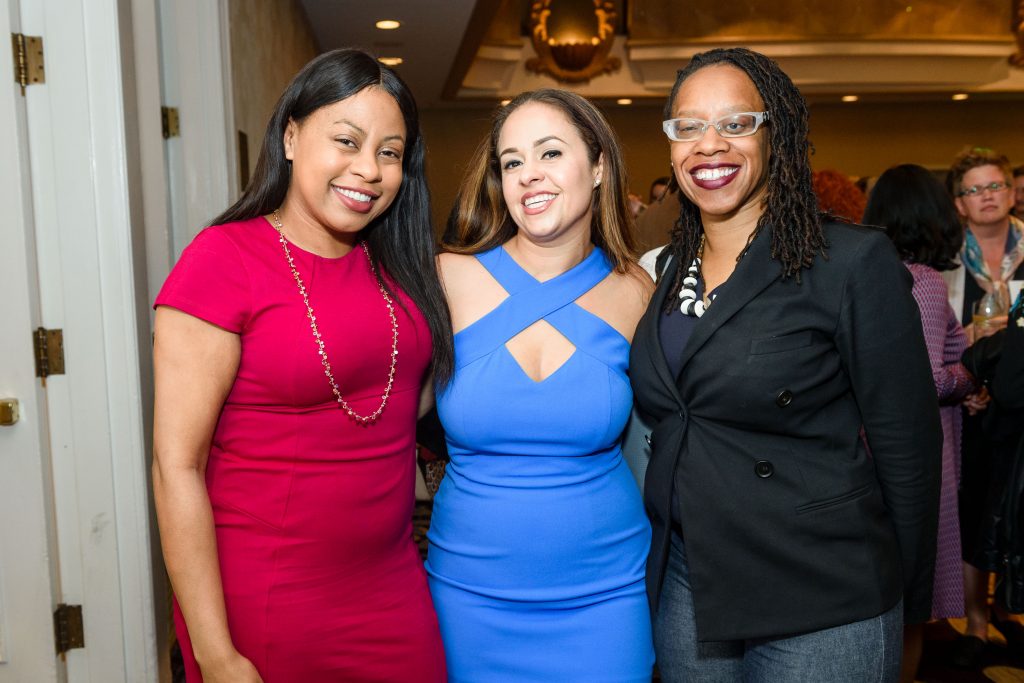
In this powerful conversation, Lateefah Simon, President of the Akonadi Foundation, talks to two sisters in the movement—our Deputy Director Marlene Sanchez and EBC Board Member Shanell Williams, President of the Board of Trustees of the City College of San Francisco—about the importance of prioritizing healing in this work, centering the ideas and leadership of incarcerated people, and how their personal experiences have helped them advocate for policy change.
This conversation has been edited for clarity.
Lateefah: Shanell, you’re leading one of the largest community college districts in the country, perhaps the world. What hopes did you have, and do you have for being a part of the board of the Ella Baker Center?
Shanell:
First and foremost, we’ve been on this journey with each other for 20 years and just to see that, and to be at this point in our journey is so surreal for me and just so powerful. So, thank you for this opportunity to be in conversation with my sisters and shout out to EBC for celebrating 25 years.
For my work and the advocacy I do, it’s important for me to stay rooted in where I come from. I was raised in the Fillmore district in the midst of the war on drugs, and we know the Fillmore, it was rough growing up. I went into the system at 13 years old. I remember the [Young Women’s Freedom Center] coming into juvenile hall and talking with us. I had never been exposed to that level of pure support and love, and just sisterhood, and that really stuck with me; it planted a seed. And from that seed, I went into an all girls, residential facility, spent two years there, was able to get out and begin to get into the work.
So, it’s always about staying rooted in where I started. You know, elected official or not, I cannot ever lose that root because that root is what drives me. It’s what gives me that fire and the passion to do the work that I do, to fight for our young people to have dignity, for our Black and Brown families to have dignity. It’s just about staying rooted—so I was so honored to be asked to be on the board [of the Ella Baker Center] and just want to continue to fight. I know that we shut down the youth prison, but we have work to do outside of the walls. I mean, the struggle continues. It’s really about, how do we create the safety net for our youth that’s beyond those walls.
Lateefah: Marlene you always talk about, if we had the keys to open up all the doors, then what? The Ella Baker Center helped shut down numerous jails throughout California, but now a system-wide institution that few have seen [the Division of Juvenile Justice]. So, young people are going to be coming home because of the work of the Ella Baker Center and your allies.
What can that look like—both the challenges and also the promises—what are you hopeful for?
Marlene:
My sisters, my siblings in the struggle, I’m really happy to be here with you all. I remember we used to have these conversations, Lateefah—like what if the day came where we closed down these [youth prison] facilities or they just unlocked the doors and we freed our people, what would we do? I’m really excited to be at an organization that really cares about implementation. I think that that really is what sets us aside at EBC, that implementation is critical to our work.
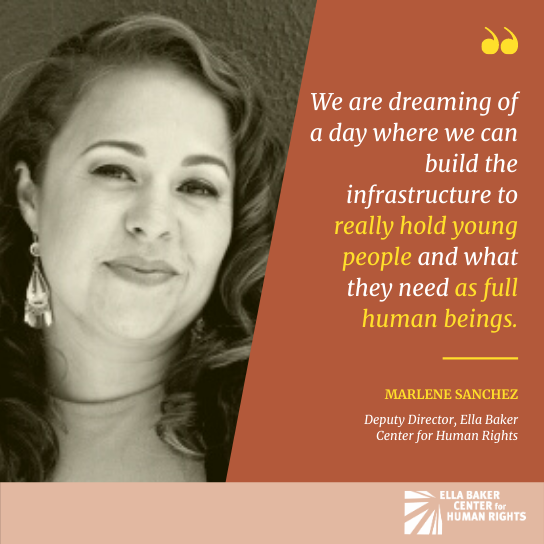
When we organize people who are currently incarcerated, we actually break down those barriers that help build the prison industrial complex. They don’t want us to build power, they don’t want us to organize and so when we do that, we actually start to kind of chip away at those barriers. I think it’s important that we’re thinking about a robust system that really looks at young people from birth to college and beyond, right. That we are dreaming of a day where we can build the infrastructure to really hold young people and what they need as full human beings. You know, Alameda County spent half a million dollars incarcerating young people last year. This year, still half a million dollars per youth per year.
When we look at what we can do with those resources, what we can do with half a million dollars for young people, what we can do with these systems. I think that the new bill to close DJJ the right way [SB 823], to really look at realignment has really been led by coalitions. It hasn’t been us alone, it has been EBC in partnership with many different organizations, for instance the Free Our Kids coalition. But, it was about how do we close this [DJJ] the right way because we know the system likes to reinvent itself.
Lateefah: The Ella Baker Center has been known to shut things down, not just institutions but offices of elected officials. Last year, the Ella Baker Center was included in most of the Governor’s bill signing ceremonies about criminal justice reform.
How do we, in this moment, hold politicians accountable and see our work through while also centering folks?
Marlene:
I just want to say that we really need to center not only the needs, but the ideas and the leadership of currently incarcerated people. When I was growing up in the work, there wasn’t an idea that we couldn’t do because we actually led. And we had people that really stood behind us and allowed us to do that. I think with this Ella Baker Center Inside/Outside Fellowship, there was a family who said, “Do what you all need to do.” Then we took that and said, “What do other folks need?”
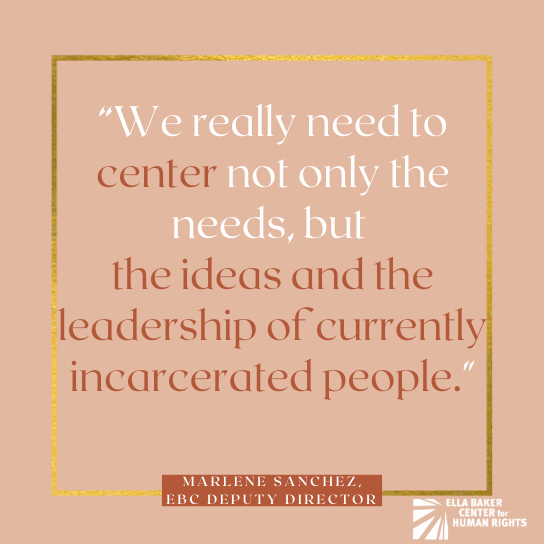
You know, I’m also removed; I haven’t been incarcerated in years. I am really mindful of how we are creating opportunities in leadership and listening to folks on the inside so that we are also not creating unintended consequences, because that happens even with the best intended formerly incarcerated people. I think Thanh [EBC Inside Fellow] said it well, being formerly incarcerated alone is not enough.
How are we really not only listening to the ideas and leadership, but also the needs of incarcerated people? I think folks inside [prison] told us, you all have to have bills that are specific to COVID, that are specific to programming, there’s folks who are not getting out for 20 years. And that may not be the freshest bill around prison abolition, but it’s what people need right now, so we need to listen to that. The policy team at EBC is a rockstar team. We have 10,000 members, 7,000 of those members are inside prisons. They have hundreds of volunteers writing to them weekly and asking questions. And then, we have a resentencing guide that goes into how to fight for yourself, because there’s no way that we’re all going to be able to support every single person. But really, it’s giving folks the tools so that they can fight for their own liberation, and it’s about how we really listen and then put the resources where it’s due.
Lateefah: Shanell, you are one of maybe two Black women previously incarcerated elected officials in the Bay Area.
Why is that central when we talk about building power? What policies have you been able to move forward, as an elected member who has been previously incarcerated in these systems?
Shanell:
Well, I definitely want to build on what Marlene was speaking to in terms of connecting those dots and connecting our lived experiences with the policy piece. Because I think that a lot of times, we’re bringing folks to the table for on-the-ground work but not bringing folks to the table for those policy discussions, for those votes.
I didn’t even know I was actually one of the only formerly incarcerated electeds, so that was really powerful to learn that. Just being able to be in the room and to be able to have that vote, and to bring that perspective to the table, it’s so valuable in real time. Because a lot of times, these decisions being made are removed from that perspective. I think when we talk about implementation, and actually taking these ideas and really bringing it to life; I mean being able to have that perspective, have that background, have that lived experience has been a huge asset.
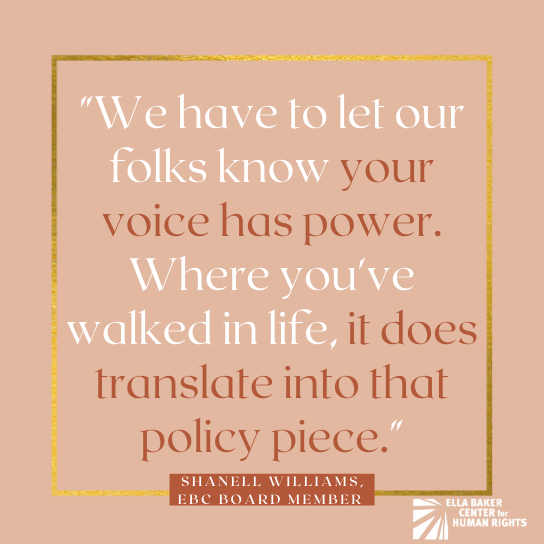
At City College, we’re under threat of closure and loss of accreditation, and folks really weren’t able to imagine what that would mean for lives across not only San Francisco, but across the Bay Area and beyond. We just would hear all these stories of generations that have passed through the institution and what they have gotten from the institution. I just think about, where would we be without those stories? It’s not that we want to only rely on those stories, but those stories do bring power to that policy conversation and to those important decisions. We have to let our folks know your voice has power. Where you’ve walked in life, those experiences you have in life have power and it does translate into that policy piece.
I also think back to that political education and to, again, connecting the dots between the things that I was experiencing in my real life to the policies that were being shaped. I think bringing in those stories and lifting folks up to feel empowered to be at the table and tell those stories, is just so critical.
Lateefah: We are celebrating 25 years of the Ella Baker Center, a generation-plus of an organization that has been able to hold the line, unapologetically, to free young people, to close unnecessary institutions that don’t heal us.
Why, in this moment, are you all unapologetic with talking about the healing work, the cultural work, and the self determination work that it takes to build really a padre of our Harriet Tubman, of our Frederick Douglass? Why is that work critical and why it ain’t free?
Marlene:
Yes, some of the most expensive work we did actually was the healing work. I just want to put that out there. You know, when I started healing, my family started healing. As a young mom at 19, it was important for me to begin that journey, not only for myself but for my son, and now for his son. It’s been beautiful to be able to see that generational healing happen. The healing is really also about self determination and resourcing folks to do what they know works.
We have been able to pull from our indigenous practice and really look at what our folks have done to not only survive but really thrive. Healing, it’s a journey, and it is also a movement strategy that sustains this work. The only reason I’ve been around for 20 years is because I engaged in healing work at 19.
Shanell:
This is just my favorite piece, you know the healing justice piece. Because I had the privilege of spending those two years in a sisterhood and really diving into the healing work that I had to do, and I know a lot of folks do not have that opportunity. So it is a mission, it’s expensive work but it’s important. And, I think if we’re putting folks out there on the frontlines, being invested in their own healing journey as part of that work and, you know, just really being invested in that and allowing folks to choose what that healing looks like for them. You know, it’s not all a one-size-fits-all. And it’s a journey, it’s a continuous journey. I’m still in the healing journey.
We know state violence comes in many forms, right. In the work I do with Black and Brown birthing folks, we know the medical system is extremely racist and has done so much harm, and so just thinking about all of those institutions and the harm that’s been done, especially right now. I think that we’re at that breaking point where we have to, for the sake of our movement, prioritize the healing. Not saying that it’s secondary, but it’s integrated into the work. I’m just really amazed that EBC is on the vanguard with that because not a lot of folks are talking about healing in this work.
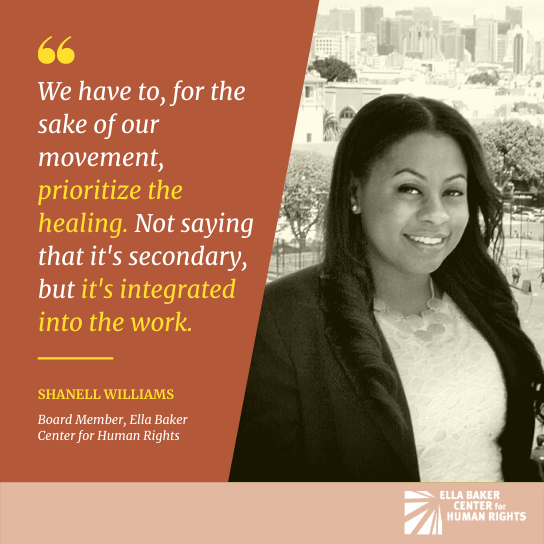
Lateefah: How are you all spreading this evangelism of justice; that it is about culture, it is about policy work, it is about healing, it’s about centering people who have been failed by public systems?
Marlene:
I think a perfect example of that is Night Out for Safety and Liberation (NOSL) as one way where we are celebrating all the joy, the love, the culture that young people bring and the ways that community keeps each other safe. I think that is one way and what’s happening again this year and last year, we did NOSL virtually and expanded to other parts of the country. I think Night Out for Safety and Liberation is one of those examples that celebrates joy and love and solidarity and culture and healing. We need to show people more examples of that, because I think people are definitely motivated by love, for what’s right and what’s good, other than just what’s wrong.
Lateefah:
Absolutely, not only do we need many of us, we take for granted that there’s going to be this institution that believes in the sanctity of childhood, that believes in the beauty of redemption, that believes in the power not only of hard work, but of healing work, and hard work where learning is expected and it’s nurtured. The Ella Baker Center is an organization that many of us have seen walk its talk, and throughout any and all transitions has become more powerful.
As a friend of Ella Baker, this sister of the center is a sister of you all. Freedom is not free. I want to thank you, my sisters, our board member Shanell Williams and our Deputy Director Marlene Sanchez. Thank you for your truth and for your words.